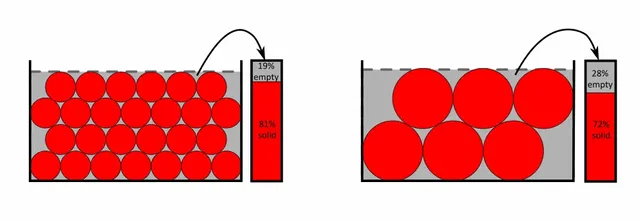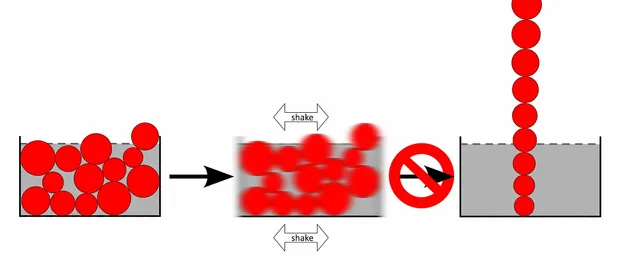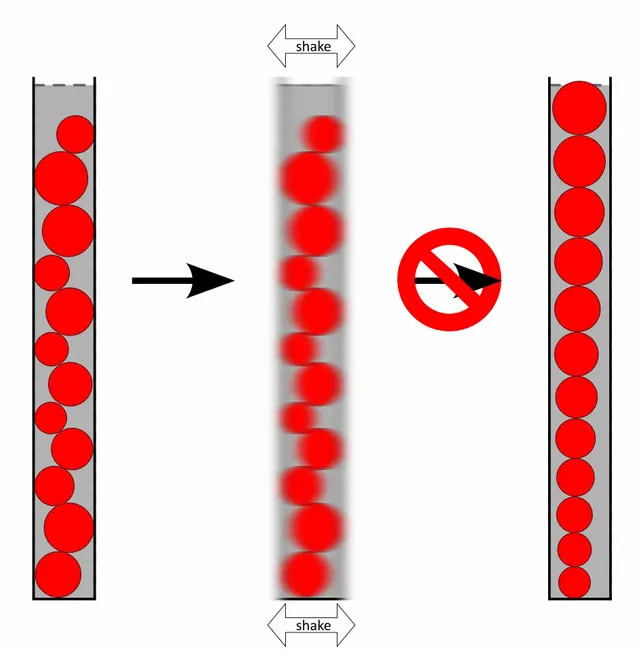Trust the process?
(cross-posted from my substack)
Trust the process?
A teleological failure mode
I chose the name TTRPG Teleology for this substack partly for the alliteration and rhyming and partly because teleology was the best term I could think of for considering how things work and what they’re for. But teleology is a fraught concept, at least partly because it’s easy to jump to conclusions about what a process is “really” about. This post is about one way that can happen. But first, an illustrative metaphorical example.
The Brazil Nut Effect
If you have round objects you can pack more small ones into a given space than large ones because of how tightly the geometry allows you to squeeze them together, there’s more empty space around large ones.

So if you have a bunch of mixed-sized round objects in a container, even if the actual material is the same density, a larger rounded object will tend to act like it has a lower density then a smaller rounded object because of the “empty space” around it. While solid objects will stay locked into their positions at rest, if the arrangement is jostled enough to allow the objects to move around the “high density” small objects will tend to sink toward the bottom and the “low density” large objects will tend to float toward the top. You can also think of it like smaller objects having an easier time slipping through gaps and falling down and larger objects being more likely to get “stuck” higher up. This is called the “Brazil Nut Effect” because it happens with cans of mixed nuts: if the can is shaken the large Brazil nuts will tend to rise to the top and the small peanuts will tend to sink to the bottom.

If you think about using this process intentionally, you might key in on the idea that the purpose of the process is to sort the objects from large to small. But this would be an over-extrapolation, there is no way for this process to create a globally sorted stack of objects, the “sortation” is a limited, local process.

But if you were convinced about the end result needing to be a sorted set of objects you might start “fixing” your process to eliminate the “bugs” – you might be tempted to narrow the container down so a sorted stack can’t fall over. At this point the process may look like it achieves the desired end-state when you manually place all the objects in a sorted way, but in order to do this you’ve actually bypassed the Brazil nut effect – it literally can’t work if it’s not possible for the objects to slide past each other. Imposing this perceived “purpose” on the process actually inhibits the mechanism that was supposed to do the work.

Back-projecting an over-extrapolated purpose onto games
The most common example of this in tabletop roleplaying games is “railroading” – someone perceives that there’s something like experiencing a story happening when you play an RPG, so they key in on “experience a story” as the purpose of an RPG, and then make it happen in a way that effectively bypasses or overrides the agency of the other players. This idea of the game’s purpose can end up in tension with the things that make it function as a game.
We can also see examples of this with sports. If someone projects a purpose like “it determines who is the best” onto a sporting competition then people who think they’re the best don’t want the competition to give the “wrong” answer. It’s the motivation for using things like smack talk or other outside-the-formal-game elements to impose pre-existing beliefs about who deserves to be on top onto the competition. It’s why narcissists seem to not mind cheating in order to win – they just care about whether their “I’m the best” story is reinforced. The theme of a disconnect between entrenched status and competition is explored in Rocky III by asking if Rocky can be considered a true champion if he’s not facing the toughest opponents in the ring.
It also happens in broader contexts
Evolution Evolution via natural selection was given the shorthand “survival of the fittest”, which people can over-extrapolate into thinking that evolution is about generating or identifying the “best organism”. If you’re a human you’re likely to think that humans are the best, and interpret evolution as a process that produces things like you. But Darwinism actually says that any currently-thriving species is doing well – no “strategy” is inherently more or less valid as long as the genes are getting into the next generation – evolution is also a process that produces cockroaches, raccoons, and viruses, we’re all wining. The “Social Darwinists” of the 19th century took it beyond species and felt that evolution had coronated the rich and powerful as deserving to be at the top of society, and thus felt it was only natural they leverage every advantage in order to reinforce that already-decided outcome (why trust a messy process like fair competition when you already know what the right answer is supposed to be?).
Market Economies In a theoretical free market every transaction should increase overall satisfaction because any given agent only agrees to the trade if it is in their interest to do so – the butcher and baker trade because they’re both happier if they can have sandwiches. But if you project maximizing agents’ own interests onto the market then you might be inclined to see pursuing structural advantages like having a monopoly as the “smart” way that agents should be engaging – thereby bypassing or overriding the independent choices of most agents, the very thing that’s supposed to make a free market work.
Deliberative Bodies If you perceive the process of a deliberative body like a legislature as getting “good policies” passed then you might be inclined to pursue a strategy of partisanship – if your party has 51% of the vote then you win every time and your preferred policies are enacted (which are good, from your party’s perspective). But this strategy depends on the individual legislators not independently deliberating and voting but instead voting how “the party” wants them to. This projection of what it’s “really about” onto the deliberative decision-making body makes it stop working as a place that policies are discussed and decisions are made and turns it into something rigid and performative – see, for example, the current United States Congress where holding a vote that doesn’t go the leadership’s way or having your party fail to vote in lockstep is considered a political blunder, and individual legislators making deals for things that are preferred by their particular constituency are viewed with suspicion even though that’s theoretically a legislator’s job.
Circling back to games
This problem can also manifest from an aesthetic-first model of game design: you know what the final result of a design process is supposed to look like, whether that’s tracking an “industry standard” of how RPGs are done or some graphic-design goal (one page RPG, etc.). But, like the “just glue some gears on it” version of steampunk, an outside-in aesthetic-first approach is no guarantee of a thing that works, and may actually impose constraints that interfere with working well. A well-functioning thing often has an element of beauty due to elegance, but not every beautiful thing is well-functioning.
In general I think the commerce-first orientation of the indie TTRPG world invites this sort of problem. I think the crowdfunding and social media attention economies reward games that look right rather than games that are designed well, and tempts designers to focus on status and notoriety so they can be enough of a microcelebrity to have a shot at success rather than focusing on the craft of game design. Theoretically being tied to real-world goods and services ought to keeep things grounded in some sort of reality, but there are so many other factors affecting the existing TTRPG market that it’s probably better for sales to be a PT Barnum-esque huckster than to be someone who makes good stuff or is trying to explore interesting questions.
Avoiding this problem
In both games and human institutions more broadly I think we need to be especially concerned about agency getting crunched when top-down or from-outside-in ideas are imposed onto a process. Sometimes it’s fine when things become purely symbolic or ceremonial (you probably don’t want the officiant at a wedding to have a substantive role in deciding whether the marriage happens), but allowing for individual agency and distributed, decentralized mechanisms often feels messier than the simple stories we can tell from an over-extrapolated “true purpose”.
As a heuristic, I think it makes sense to be careful if the mechanism is supposed to work locally but the perceived purpose is happening at some totalizing level. Processes tend to be about how journeys happen, not what destinations they arrive at. Processes are usually about relative changes: better rather than best, improvement rather than ideal. Complex things are often balancing multiple important factors, it will be rare that a single factor will be the purpose (efficiency, speed, cost, etc.).